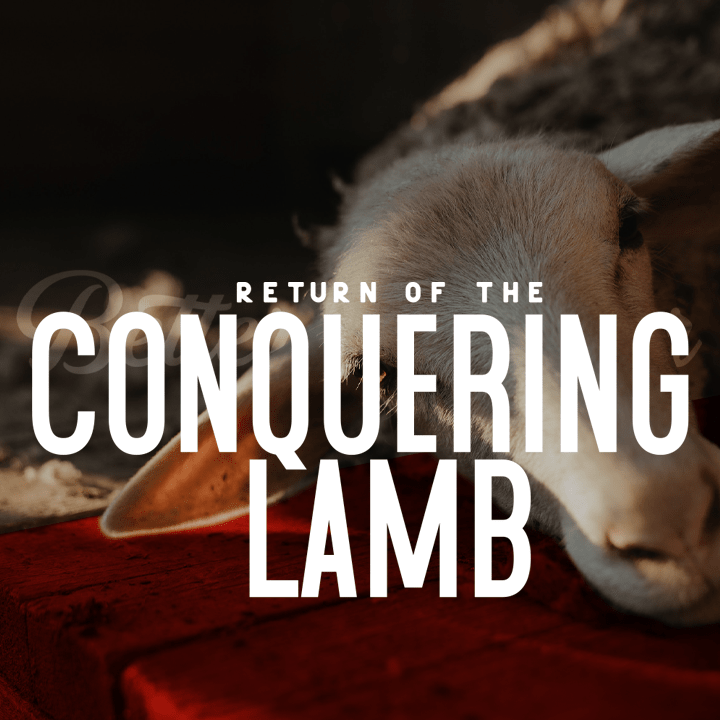TEACHING
|
SUNDAY, SEPTEMBER 12, 2021
10:30 AM (ONE GATHERING for September, In-person + livestream + KIDS!, IBC campus) Return of the Conquering Lamb Revelation 20:1-10 Biblical Beliefs of the End Times Have you been taught to read the Book of Revelation like a horoscope? Christians with a high view of the Bible have not agreed on how to understand the events that come before the Return of the Lamb/King. This Sunday, we look at three views of "the Millennium"—what can we all agree on, and what should clearly be labelled as secondary. We continue the conversation about the Mark of the Beast, Mark of the Lamb, Anti-Christ(s), and our relationship with our earthly "Babylons". EMAIL QUESTIONS HERE or TEXT: 604-426-1230 CONNECT WITH US HERE GIVE HERE |
READ: Revelation 20:1-10; Matthew 25:1-13; Luke 12:35-40
TAKE OFF
"In essentials, unity; in non-essentials, liberty; and in all things, love." (Comenius, Unum Necessarium, 1668).
NAB Statement of Faith
9. We believe God, in His own time and in His own way, will bring all things to their appropriate end and establish the new heaven and the new earth (Ephesians 1:9–10, Revelation 21:1). The certain hope of the Christian is that Jesus Christ will return to the earth suddenly, personally, and visibly in glory according to His promise (Titus 2:13; Revelation 1:7; 3:11; John 14:1–3). The dead will be raised, and Christ will judge mankind in righteousness (John 5:28–29). The unrighteous will be consigned to the everlasting punishment prepared for the devil and his angels (Matthew 25:41, 46; Revelation 20:10). The righteous, in their resurrected and glorified bodies, will receive their reward and dwell forever with the Lord (Philippians 3:20–21; 2 Corinthians 5:10; 1 Thessalonians 4:13–18).
FLIGHT
I. A grid for all things Christian - The Great Orthodox Tradition: Know the Heretics (primary/secondary/opinion)
“Tradition refuses to submit to the small and arrogant oligarchy of those who merely happen to be walking about. All democrats object to men being disqualified by the accident of birth; tradition objects to their being disqualified by the accident of death. Democracy tells us not to neglect a good man’s opinion, even if he is our groom; tradition asks us not to neglect a good man’s opinion, even if he is our father.” -GK Chesterton
“...the medieval church went overboard on dealing with heresy. However today we've gone the other way - therefore making everything - and then nothing is heresy” (Holcomb, Know the Heretics).
Some Christians misuse the word to refer to anyone who does not agree with their particular version of the faith.
Matthew 24:4 tells us we need to be alert to deception, and that we are to guard the basics - the primary things of the Gospel (1 Corinthians 11:2, Galatians 1:8).
Jesus - Dogma - Doctrine - Opinion
TAKE OFF
"In essentials, unity; in non-essentials, liberty; and in all things, love." (Comenius, Unum Necessarium, 1668).
NAB Statement of Faith
9. We believe God, in His own time and in His own way, will bring all things to their appropriate end and establish the new heaven and the new earth (Ephesians 1:9–10, Revelation 21:1). The certain hope of the Christian is that Jesus Christ will return to the earth suddenly, personally, and visibly in glory according to His promise (Titus 2:13; Revelation 1:7; 3:11; John 14:1–3). The dead will be raised, and Christ will judge mankind in righteousness (John 5:28–29). The unrighteous will be consigned to the everlasting punishment prepared for the devil and his angels (Matthew 25:41, 46; Revelation 20:10). The righteous, in their resurrected and glorified bodies, will receive their reward and dwell forever with the Lord (Philippians 3:20–21; 2 Corinthians 5:10; 1 Thessalonians 4:13–18).
FLIGHT
I. A grid for all things Christian - The Great Orthodox Tradition: Know the Heretics (primary/secondary/opinion)
“Tradition refuses to submit to the small and arrogant oligarchy of those who merely happen to be walking about. All democrats object to men being disqualified by the accident of birth; tradition objects to their being disqualified by the accident of death. Democracy tells us not to neglect a good man’s opinion, even if he is our groom; tradition asks us not to neglect a good man’s opinion, even if he is our father.” -GK Chesterton
“...the medieval church went overboard on dealing with heresy. However today we've gone the other way - therefore making everything - and then nothing is heresy” (Holcomb, Know the Heretics).
Some Christians misuse the word to refer to anyone who does not agree with their particular version of the faith.
Matthew 24:4 tells us we need to be alert to deception, and that we are to guard the basics - the primary things of the Gospel (1 Corinthians 11:2, Galatians 1:8).
Jesus - Dogma - Doctrine - Opinion
The early church developed "rules of faith" that were part of the teaching of the apostles and prophets. These are passed on through songs, scripture, sermons, and baptismal creeds. Way before the developments in Nicaea and Chalcedon. This leads to the Apostles and Nicene Creeds and so on (G. Boyd).
Secondary issues, if left in second place were not labelled heresy, only when they get wrongly elevated to the primary position.
(Holcomb 16) Heresy is not anything that does not agree with your own interpretation of Scripture. There are primary and secondary elements - not everything is a pillar. So we don't call people heretics based on debates on the (for example): millennium, baptism, the role of women in ministry, nature of the atonement. "The church of the NT shows us that they walked the line between holding fast to some convictions and being flexible about others."
When we talk about the end times, it's important to understand the specifics that Dr. John MacArthur, Dr. David Jeremiah, or RC Sproul (insert one's favourite teacher here __________) espouse. Some are central, but most are not and should never be used to judge and divide the church. Repeat...
Not all errors are equally serious. The Roman and Reformed churches had/have three categories (Holcomb):
1. Errors directly against a fundamental article
2. Errors around a fundamental or in an indirect contradiction to it
3. Errors beyond a fundamental article
II. Spectrum of End Times Beliefs
Some Key Words/Ideas:
Justin Martyr (2nd Cent) on premillennial view, “...Many who belong to the pure and pious faith and are Christians think otherwise"(Grenz, Millennial Maze, 39).
Three views of Millennium
Secondary issues, if left in second place were not labelled heresy, only when they get wrongly elevated to the primary position.
(Holcomb 16) Heresy is not anything that does not agree with your own interpretation of Scripture. There are primary and secondary elements - not everything is a pillar. So we don't call people heretics based on debates on the (for example): millennium, baptism, the role of women in ministry, nature of the atonement. "The church of the NT shows us that they walked the line between holding fast to some convictions and being flexible about others."
When we talk about the end times, it's important to understand the specifics that Dr. John MacArthur, Dr. David Jeremiah, or RC Sproul (insert one's favourite teacher here __________) espouse. Some are central, but most are not and should never be used to judge and divide the church. Repeat...
Not all errors are equally serious. The Roman and Reformed churches had/have three categories (Holcomb):
1. Errors directly against a fundamental article
2. Errors around a fundamental or in an indirect contradiction to it
3. Errors beyond a fundamental article
II. Spectrum of End Times Beliefs
Some Key Words/Ideas:
- Eschatology ἔσχατος
- Premillennialism, Postmillennialism, Amillennialism, Moderate Preterism. *The current religious term "premillennialism" did not come into use until the mid-19th century.
- Dominionism, Dispensational-Premillennialism
- Rapture (two-stage vs. one-stage)
- Imminent return
- Parousia παρουσία
- Maranatha Μαρανα θα
- Civil religion - Babylon - Rome
- The Beasts - Mark of the Beast
- The Lamb
- Jesus will... _________________________
- The General, bodily ________________________
- All believers will __________________________
- _______________________________
- _______________________________
Justin Martyr (2nd Cent) on premillennial view, “...Many who belong to the pure and pious faith and are Christians think otherwise"(Grenz, Millennial Maze, 39).
Three views of Millennium
- Premillennialism - "Return before the Reign"
- Postmillennial - Working toward and Waiting for a Coming Reign of Peace Postmillennial view
- Amillennial View - The Symbolic Thousand-Year Conquest of Satan
LAND THE PLANE
Final Word
“How do we live in-between the times?” will be the final message.
- Check yourself! ___________________________
- Imminent return - __________________________
- Be Ready ___________________________
Final Word
“How do we live in-between the times?” will be the final message.
For Reflection and Discussion
- There are many “end of the world” stories out there both religious and non-religious (although really everything is “religious”). Which ones do you find partly truthful, which ones are a “big-stretch” for you, why? (Think about the fears and hopes politicians, media/movies, and world governments play up).
- When did you first learn about the second coming of Christ? What did you learn. What did you question? How was it presented?
- Why do you think some people let themselves get very worked up/
excited about secondary and third-level doctrines, beliefs, and opinions? What good comes from this? What is bad for us and the local church? - Reread the core teaching passages and discuss.
- Jesus said no one knows when the end will come. Why do various
teachers try to keep “discerning the times” instead of pointing to the clear teachings of Jesus about “be ready”? - What does “be ready” look like?
- Other thoughts?



